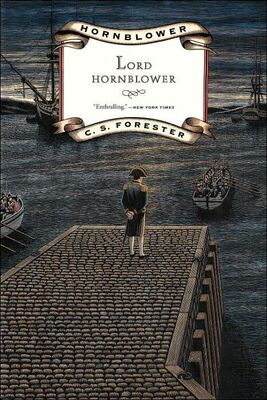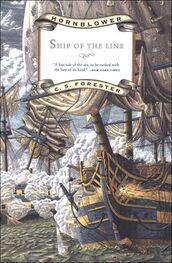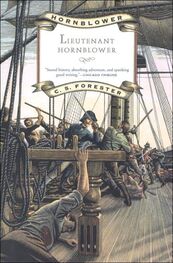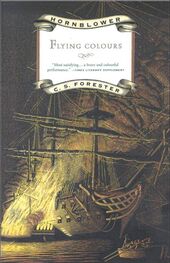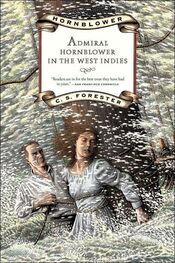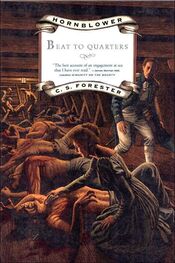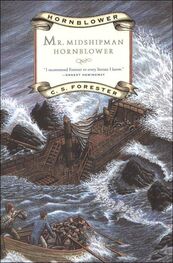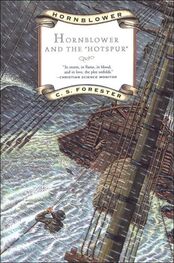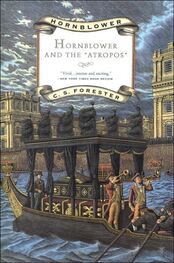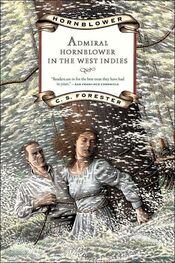“Come on,” he repeated. “Come on, Frenchmen.”
Then he knew he had failed. A few stirred reluctantly; more looked to see how their comrades acted, and then deliberately lay down again, some on their backs, some with their faces pillowed on their forearms, with the rain still dropping on them.
“An hour’s rest,” pleaded one voice.
Someone—Hornblower guessed it was young Jean, not yet seventeen—was sobbing unashamedly and loudly. The men had reached breaking point. Someone else, someone with greater powers of inspiration, might have got them to move again, Hornblower told himself, but it was beyond him. Had the ford been practicable they would have crossed it, and staggered on a mile or two the other side, but in the face of this disappointment they were capable of nothing further tonight. And they knew, the same as he did, that there was nothing to go on for. The rebellion was at an end, whether they marched till they died or gave up now. The thunderstorm, the flooding of the ford, had balked it. The men were realists after this experience of guerrilla warfare, and knew that anything further they did would be only a gesture. They all knew of Clausen’s proclamation offering amnesty, too. Brown was at his side, eloquent in his silence, a hand on the butt of a pistol in his belt. Brown, himself, Marie; the Count and Annette, for what they were worth. One or two more—old Fermiac for one—were all he could count on. It would be enough for the moment. He could shoot a couple of the most obstinate of the objectors, and the rest would get to their feet and march, sulkily. But he could hardly keep unwilling men together in a march in darkness. They could slip away too easily; nor would it be difficult for someone more discontented or desperate than the others to slip a knife into his back on the march or put the muzzle of his musket to his ribs and pull the trigger. He was prepared to face that risk, he was prepared to kill a couple of malcontents, but he could see no real benefit from such action. There was one thing left for him to do, the last resource of the hunted guerrilla leader, to disperse his band and hope for better days to come. It was a bitter pill to swallow, especially in view of the desperate danger to Marie and the Count, but it was not a matter of choosing the best of possible alternatives. He had to choose the least bad. But failure was a horrible thing.
“Very well,” he said. “It is here that we say goodbye.”
Some of the men stirred at those words.
“’Oratio!” said Marie, and then ceased abruptly. She had learned the lessons of discipline.
“Your lives are safe,” went on Hornblower. “You have all read Clausen’s proclamation. Tomorrow—tonight if you will—you can make your way to the troops and surrender. You can go to your homes. Madame and the Count and I go on, for go on we must. And we would even if we need not.”
The men were stunned into silence by his words. No one stirred, no one spoke in the darkness. The two weeks of toil and danger and hardship through which they had just passed seemed like a lifetime to most of them, and it was hard to realise that a lifetime had come to an end.
“We shall return,” continued Hornblower. “Remember us when you are in your homes. Think of us. We shall return with a fresh call to arms. Then we shall all of us gather again in our strength to thrust down the tyrant. Remember that. And now one last cheer for the King! Vive le Roi!”
They cheered, feebly enough, but Hornblower had achieved what he set out to do. He had sowed the seeds of a later rebellion; when Clausen’s division should move away it would be possible to set the Nivernais in a turmoil once more should a leader arise—should he and the Count ever succeed in making their way back into the province. It was a desperate, slight hope, but it was all that remained.
“In the name of God!” said Fermiac. “I come with you now.”
“I also,” said another voice in the darkness.
Perhaps with these Frenchmen it might be possible now to make an hysterical appeal to them, carry them away on a wave of emotion, set them marching once more. Hornblower felt the temptation, and he had to balance the pros and cons coldly. That sort of hysteria would hardly survive the shock of the men’s feeling their leg weariness. Some of the men simply could not march farther. It would not do; by dawn next day he would not have six men with him, and time would have been irretrievably lost.
“Thank you,” said Hornblower. “I shall remember that in time to come, Fermiac, my friend. But we must ride, and ride hard. Four of us and six horses gives us the best chance. Go back to your wife, Fermiac, and try not to beat her on Saturday nights.”
He even got a laugh by that, at this moment of all moments. It helped to keep the parting on a sane level, the level he was aiming at with an eye to the future. Yet he knew there was no future; he knew it in his soul, in his bones, even while he gave the order for the pack-horses to be stripped of their loads, even while he forced Brown in a bitter argument to leave Annette behind and make her life safe. He was going to die; probably Brown was going to die. And Marie, dear Marie—while his spirit tossed on wave after wave of emotion, of remorse and self-condemnation, of fear and regret, uncertainty and despair, his love for her endured and increased, so that her name was in his mind as a constant accompaniment to his thoughts, so that her image was in his mind’s eye whatever else he was picturing. Dear Marie, sweet, beloved Marie.
She was leading a spare horse, and Brown was leading the other; the four of them were mounted on the best of the six. The animals slipped and plunged over the rough surface at the water’s edge until they reached the path above the river. They walked dispiritedly through the darkness. Hornblower could hardly sit in his saddle with his weariness; he felt giddy and sick, so that he had to hold on to the pommel of the saddle in front of him. He closed his eyes for a moment and instantly seemed to be swept over some vast smooth declivity, like the boat going over the cataract of the Loire four years before; he was almost out of his saddle before he recovered himself, jerking himself upright and clinging to the pommel like a drowning man. Yet at the foot of the declivity he had known that Marie was waiting for him with the brooding love in her eyes.
He shook off delirium. He had to make plans, to think how they could escape. He called up before his mind’s eye the map of the country, and marked on it what he knew of the situation of Clausen’s flying columns. They constituted a semicircular cordon, whose diameter was the river, and at whose centre he found himself at present. So far he had buoyed himself up in this danger with the hope of passing the river by Marie’s ford. Hard on their heels, he knew, was marching a half-battalion of the 14th Leger, which had apparently been given the duty of direct pursuit while the other columns headed him off. At nightfall that half-battalion was presumably six or seven miles behind, unless—as might easily be the case—its commanding officer forced his men to march on in the darkness. Should he try to pierce the cordon or try to pass the river?
The Count’s horse in front of him fell with a crash and a clatter, and his own nearly threw him as it plunged to avoid treading on it.
“Are you hurt, sir?” came Brown’s voice in the darkness; he must have slipped down instantly from the saddle despite the handicap of a led horse.
“No,” said the Count quietly. “But I’m afraid the horse is.”
There was a chink of bridles as Brown and the Count felt about in the dark.
“Yes. He’s slipped his shoulder, sir,” reported Brown at length. “I’ll change saddles to the other horse.”
Читать дальше